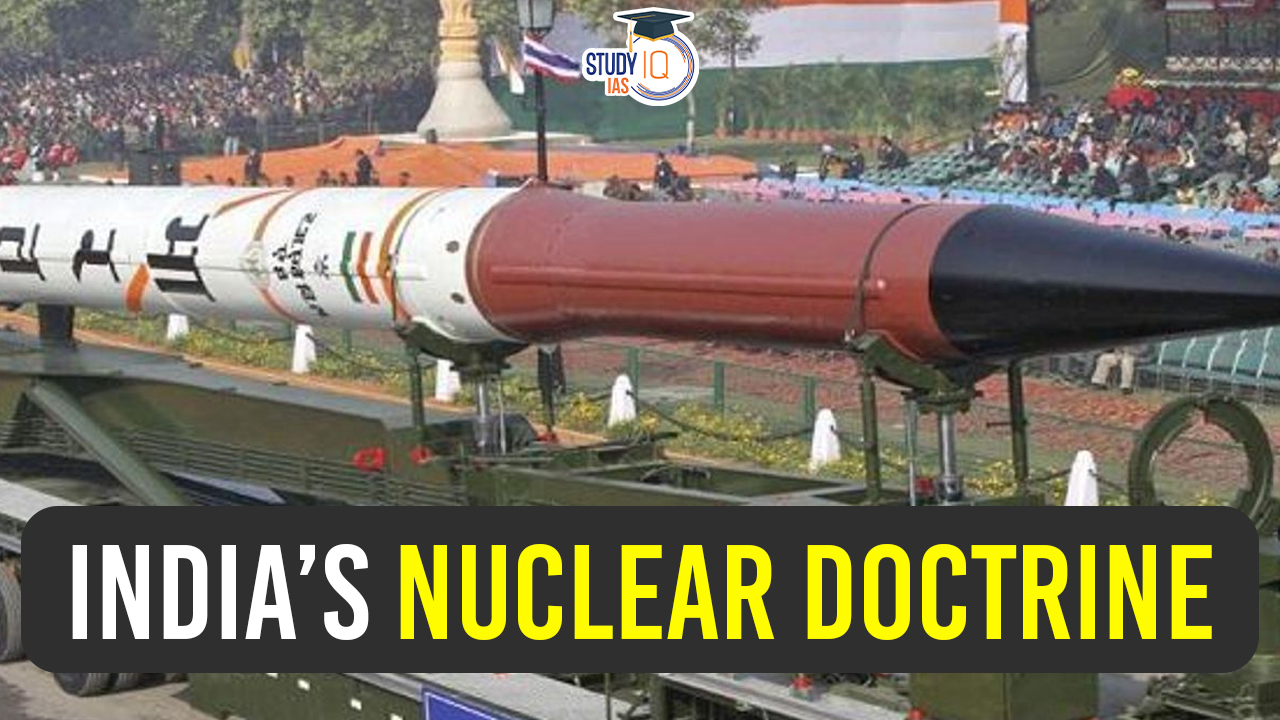Table of Contents
India’s Nuclear Doctrine is grounded in a No-First-Use (NFU) policy, committing not to initiate nuclear warfare. It emphasizes Minimum Credible Deterrence, maintaining a nuclear arsenal sufficient for deterrence but not excess. Civilian control ensures that only the Prime Minister holds the authority to employ nuclear weapons. Negative security assurances promise no nuclear use against non-nuclear states or as a first strike, promoting responsible nuclear behavior. The doctrine highlights retaliation and massive retaliation as a formidable response to nuclear aggression while excluding civilian targets from attacks. India’s commitment to global nuclear disarmament underpins its strategy for a safer world.
What is a Nuclear Doctrine?
A nuclear doctrine outlines the guidelines for the use of nuclear weapons by a nuclear-armed state, encompassing both peacetime and wartime scenarios. This doctrine serves as a means to establish deterrence against potential adversaries, communicating the state’s intentions and determination. It further provides a framework for the state’s actions and decisions in the event of armed conflict.
We’re now on WhatsApp. Click to Join
India’s Nuclear Doctrine Background
India’s nuclear program began in the late 1940s, with Homi J. Bhabha providing guidance. Despite Nehru’s stance against nuclear weapons, he actively advocated for global nuclear disarmament with superpowers. Unfortunately, global nuclear arsenals continued to grow. The landscape shifted when Communist China conducted nuclear tests in October 1964. This event prompted the five nuclear powers (the United States, the Soviet Union, the United Kingdom, France, and China), all of which were also permanent members of the UN Security Council, to push for the 1968 Nuclear Non-Proliferation Treaty (NPT) as a measure to control the spread of nuclear weapons worldwide.
India’s Nuclear Doctrine Features
India’s Nuclear Doctrine features several key principles and components that guide its approach to the development, deployment, and potential use of nuclear weapons. As of my last knowledge update in January 2022, the notable features of India’s Nuclear Doctrine include:
- No-First-Use (NFU) Policy: India maintains a No-First-Use policy, committing not to be the first to use nuclear weapons in a conflict. This policy underscores India’s focus on deterrence and retaliation rather than initiating nuclear warfare.
- Minimum Credible Deterrence: India’s nuclear posture is based on achieving and maintaining a minimum credible deterrence. This means possessing a nuclear arsenal sufficient to deter potential adversaries without pursuing an extensive stockpile.
- Civilian Control: The authority to use nuclear weapons is firmly vested in the civilian leadership of the Indian government, with the Prime Minister as the ultimate decision-maker. This ensures responsible decision-making regarding nuclear use.
- Negative Security Assurances: India has declared that it will not use nuclear weapons against non-nuclear-weapon states or in a first-use scenario against any state, even if they possess nuclear weapons. This is a commitment to responsible nuclear behavior.
- Retaliation and Massive Retaliation: India’s doctrine emphasizes credible retaliation in the event of a nuclear attack. The country aims to inflict unacceptable damage on an adversary in response to a nuclear strike, often referred to as the concept of “massive retaliation.”
- Non-Use Against Non-Combatant Targets: India’s nuclear weapons are intended for deterring military aggression and are not meant to be used against civilian populations or non-combatant targets.
- Commitment to Nuclear Disarmament: India is committed to the goal of global nuclear disarmament and has called for comprehensive and non-discriminatory nuclear disarmament measures. It actively advocates for a world without nuclear weapons.
No-First-Use (NFU) Policy of India
India’s No-First-Use (NFU) policy is a key element of its nuclear doctrine and signifies a commitment not to be the first to use nuclear weapons in a conflict. This policy was officially declared by India to reinforce its stance on responsible nuclear behavior and to contribute to global peace and security. Here are some important aspects of India’s NFU policy:
- Deterrence: India’s NFU policy is primarily based on the principle of deterrence. It serves as a deterrent to potential adversaries, signaling that India’s nuclear weapons are intended for defensive purposes only and will not be used offensively.
- Retaliation: While India commits not to use nuclear weapons first, it reserves the right to retaliate with nuclear weapons in response to a nuclear attack or a major attack with other weapons of mass destruction. This is intended to deter any nuclear aggression against India.
- Civilian Control: The NFU policy firmly places the authority to decide on the use of nuclear weapons in the hands of India’s civilian leadership, with the Prime Minister playing a central role. This emphasizes that the use of nuclear weapons is a political decision, not a military one.
- Responsible Nuclear Behavior: India’s adoption of the NFU policy is a demonstration of its commitment to responsible nuclear behavior and a desire to minimize the role of nuclear weapons in international security dynamics.
- Global Security: India’s NFU policy aligns with its advocacy for global nuclear disarmament and its support for efforts to reduce the risk of nuclear conflict worldwide. It is consistent with India’s aspiration for a world without nuclear weapons.
India’s Nuclear Doctrine Advantages
India’s Nuclear Doctrine, with its No-First-Use (NFU) policy and other key principles, offers several advantages and serves strategic, diplomatic, and security purposes. Here are some of the advantages associated with India’s Nuclear Doctrine:
- Deterrence: The NFU policy, combined with a credible retaliatory capability, serves as a strong deterrent against potential adversaries. It discourages them from initiating a nuclear conflict, contributing to regional and global stability.
- Strategic Stability: By adopting a policy that restricts the use of nuclear weapons to retaliation, India helps maintain strategic stability in the region. This reduces the risk of preemptive strikes or miscalculations that could lead to unintended nuclear escalation.
- Civilian Control: India’s Nuclear Doctrine emphasizes civilian control over the use of nuclear weapons. This ensures that decisions related to nuclear warfare are made with careful consideration and a focus on national interest, avoiding hasty or impulsive military actions.
- International Credibility: India’s commitment to responsible nuclear behavior, as reflected in its NFU policy, enhances its credibility in the international community. It demonstrates a commitment to global security and adherence to established norms.
- Avoiding Arms Race: India’s Nuclear Doctrine, with its emphasis on minimum credible deterrence, discourages the unnecessary proliferation of nuclear weapons. It encourages restraint in nuclear arms development, preventing a costly and destabilizing arms race.
- Nuclear Disarmament Advocacy: India’s Nuclear Doctrine aligns with its advocacy for global nuclear disarmament. By emphasizing its commitment to a world free of nuclear weapons, India contributes to the broader international dialogue on disarmament.
- Conflict Resolution: India’s Nuclear Doctrine promotes the resolution of conflicts through diplomatic and non-nuclear means. It encourages dialogue and peaceful negotiations as preferred methods for addressing disputes, reducing the likelihood of nuclear confrontation.
- Regional Security: The policy contributes to stability in South Asia by discouraging other regional actors from adopting aggressive nuclear postures. It can help prevent the proliferation of nuclear weapons in the region.
- National Security: Ultimately, the Nuclear Doctrine enhances India’s national security by providing a credible deterrent against potential threats. It reassures the Indian populace and ensures the country’s strategic interests are protected.
India’s Nuclear Doctrine Criticism
India’s Nuclear Doctrine, like any significant policy, has faced various criticisms from different quarters. Some of the key criticisms and concerns related to India’s Nuclear Doctrine include:
- Lack of Clarity: Critics argue that India’s Nuclear Doctrine lacks clarity in some aspects, particularly in defining what would constitute a “credible” threat that might trigger nuclear retaliation. This ambiguity can lead to potential misunderstandings or misinterpretations by adversaries.
- No-First-Use Ambiguity: While India’s No-First-Use (NFU) policy is generally seen as a positive step, some critics are concerned that the circumstances under which India might abandon NFU are not clearly defined. This lack of specificity can lead to doubts about the commitment to NFU.
- Influence of Non-State Actors: India’s nuclear infrastructure and the risk of nuclear weapons falling into the hands of non-state actors, such as terrorists, is a significant concern. Critics worry that despite India’s security measures, the risk of nuclear proliferation remains.
- Arms Race in South Asia: Some critics argue that India’s nuclear doctrine contributes to an arms race in South Asia, with Pakistan as a major regional competitor. Both countries’ nuclear postures are seen as contributing to regional instability.
- Global Disarmament: Critics contend that India’s commitment to global nuclear disarmament may be undermined by its continued development and modernization of its nuclear arsenal. Some view this as hypocritical and call for India to take more significant steps toward disarmament.
- Doctrine’s Rigidity: India’s Nuclear Doctrine, with its no-first-use and minimum credible deterrence principles, is seen by some as rigid and less adaptable to changing security dynamics. Critics argue that it might limit India’s ability to respond effectively to evolving threats.
- Uncertainty in Crisis: During times of crisis, India’s nuclear doctrine may create uncertainty about how it would respond. This uncertainty could be destabilizing and increase the risk of nuclear escalation in a tense situation.
- Limited Tactical Nuclear Weapons: The development of limited, battlefield-use nuclear weapons by India has raised concerns about the potential for their use in a conventional conflict, blurring the line between conventional and nuclear warfare.
- Non-Participation in NPT: India’s stance of not signing the Nuclear Non-Proliferation Treaty (NPT) is criticized by some countries and non-proliferation advocates, who argue that India should join the treaty as a non-nuclear-weapon state.
It’s important to note that these criticisms are part of ongoing debates about India’s Nuclear Doctrine, and opinions on the doctrine’s merits and drawbacks vary. India’s nuclear policy remains subject to periodic review and adjustment to address these concerns and adapt to changing international security dynamics.
India’s Nuclear Doctrine UPSC
India’s Nuclear Doctrine, featuring a No-First-Use (NFU) policy and Minimum Credible Deterrence, serves as a deterrent while promoting responsible nuclear behavior. Critics cite a lack of clarity, risk of arms races, and ambiguity in NFU. To address concerns, India can enhance transparency, engage in confidence-building with regional nuclear-armed states, and strengthen non-proliferation commitments. Continuous review and adaptation, nuclear security measures, and diplomatic outreach are key. India’s global leadership in advocating nuclear disarmament and promoting dialogue, alongside public awareness, resilience, and crisis management, can help strike a balance between deterrence and diplomacy while ensuring national and global security.


 Navy-Marine Expeditionary Ship Interdict...
Navy-Marine Expeditionary Ship Interdict...
 K2-18b Exoplanet: Potential Biosignature...
K2-18b Exoplanet: Potential Biosignature...
 Vehicle-to-Grid (V2G) Technology and its...
Vehicle-to-Grid (V2G) Technology and its...






















